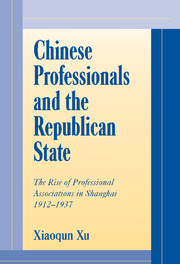 Chinese Professionals and the Republican State
Chinese Professionals and the Republican State Published online by Cambridge University Press: 07 September 2009
The story of Chinese professionals and their relationship with the Republican state is ultimately part of what is called China's modernization. One need not imply a grand theory of modernization, and one should be aware of the pitfall of measuring China with the Western experience. The question is not a theoretical question – why China failed to be like the West, or why China need not be like the West – but an empirical question – how China's development in the early twentieth century was conditioned by the China–West encounter regardless of what China would have evolved into without that encounter. In the empirical context, China's modernization refers to the kind of economic and political transformation first seen in the West but with all its complexities and ramifications rooted in the Chinese sociocultural environment.
To appreciate the nature of professionals and their role in urban society of Republican China, it is necessary to examine how the professionals emerged and became recognized as professionals in the course of modernization. Specifically, one needs to know how such professions were created, what institutional innovations were involved, and what kind of functions the professions served in Shanghai's economic, social, and cultural life. The emergence of professional groups in Shanghai had profound social implications far beyond their professional role.
To save this book to your Kindle, first ensure no-reply@cambridge.org is added to your Approved Personal Document E-mail List under your Personal Document Settings on the Manage Your Content and Devices page of your Amazon account. Then enter the ‘name’ part of your Kindle email address below. Find out more about saving to your Kindle.
Note you can select to save to either the @free.kindle.com or @kindle.com variations. ‘@free.kindle.com’ emails are free but can only be saved to your device when it is connected to wi-fi. ‘@kindle.com’ emails can be delivered even when you are not connected to wi-fi, but note that service fees apply.
Find out more about the Kindle Personal Document Service.
To save content items to your account, please confirm that you agree to abide by our usage policies. If this is the first time you use this feature, you will be asked to authorise Cambridge Core to connect with your account. Find out more about saving content to Dropbox.
To save content items to your account, please confirm that you agree to abide by our usage policies. If this is the first time you use this feature, you will be asked to authorise Cambridge Core to connect with your account. Find out more about saving content to Google Drive.